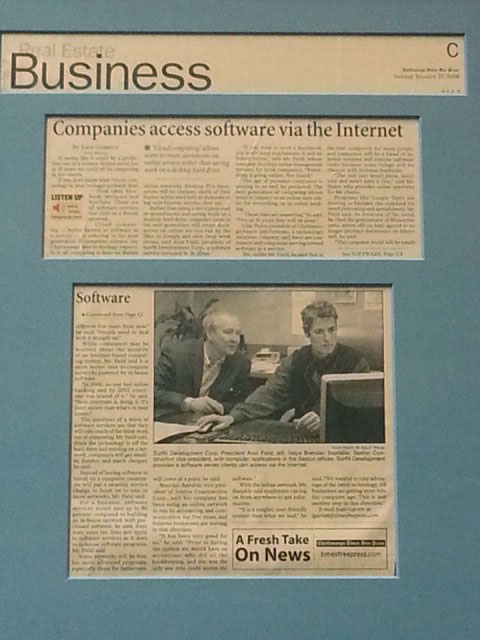|
 Chattanooga Times Free Press Chattanooga Times Free Press
January 27th, 2008
Companies Access Software Via The Internet
by Joan Garrett
It seems like it could be a prediction out of a science-fiction novel but in 10 years we could all be computing in the clouds.
If you don't know what "cloud computing" is, your teenager probably does - think eBay, Facebook, MySpace and YouTube. These are all software services that exist on a distant network.
Cloud computing - better known as software as a service - is ushering in the next generation of computer science, say Chattanooga area technology experts. In it, all computing is done on distant online networks. Desktop PC's themselves will be cheaper, shells of their former selves used only as dummies to log onto faraway servers, they say.
Rather than using a word processor or spreadsheets and saving work on a desktop hard drive, computer users in the next generation will create documents n online servers run by the like of Google and save their work online, said Alan Field, president of SurfN Development, a software service company in St. Elmo.
"If you want to send a document, you won't send attachments. It will be linked online," said Mr. Field, whose company develops online management systems for local companies. "Everything is going online, 'Net based."
The age of personal computers is coming to an end, he predicted. The next generation of computing allows users to connect to an online data center for everything, as in online banking.
"Those days are sunsetting," he said. "Five or 10 years they will be gone."
Clay Hales, president of Chattanooga-based InfoSystems, a technology solution company, said there are consumers and companies moving toward software as a service.
Yet, unlike Mr. Field, he said that in the end, computers for many people and companies will be a blend of in-house systems and remote software tasks because some things will be cheaper with in-house hardware.
"The end user won't know, won't care and won't have a clue," said Mr. Hales, who provides online networks for his clients.
Programs like Google Tools are moving to become the standard for word processing and spreadsheets, Mr Field said. As evidence of the trend, he cited the government of Massachusetts, where offices have agreed to no longer produce documents on Microsoft, he said.
"The computer world will be totally different five years from now," he said. "People need to deal with it straight on."
While consumers may be worried about the security of an Internet-based computing system, Mr. Field said it is more secure than in-company networks powered by in-house software.
"In 2000, no one had online banking and by 2002 everyone was scared of it." he said. "Now everyone is doing it. It's more secure than what's in your hands."
The positives of a wave of software services are that they will take much of the think work out of computing, Mr. Field said. Since the technology is off the hard drive and residing on a network, computers will get smaller, dumber and much cheaper, he said.
Instead of buying software to install on a computer, consumers will pay a monthly service charge to hook on to one or more networks, Mr. Field said.
For a business, software services would save up to 80 percent compared to building an in-house network with purchased software, he said. Also, states sales tax does not apply to software services as it does to in-house software programs, Mr. Field said.
Some networks will be free, but more advanced programs, especially those for businesses, will come at a price, he said.
Brendan Bastable, vice president of Sexton Construction, said his company has been using an online network to run its accounting and communication for five years and believe businesses are moving in that direction.
"It has bee very good for us," he said. "Prior to having the system we would have an accountant who did all the bookkeeping, and she was the only one who could access the software."
With the online network, Mr. Bastable said employees can log on from anywhere to get information.
"It is a simpler, user-friendly system than what we had," he said. "We wanted to take advantage of the latest technology. All businesses are getting more into the computer age, This is just another step in that direction."
|



